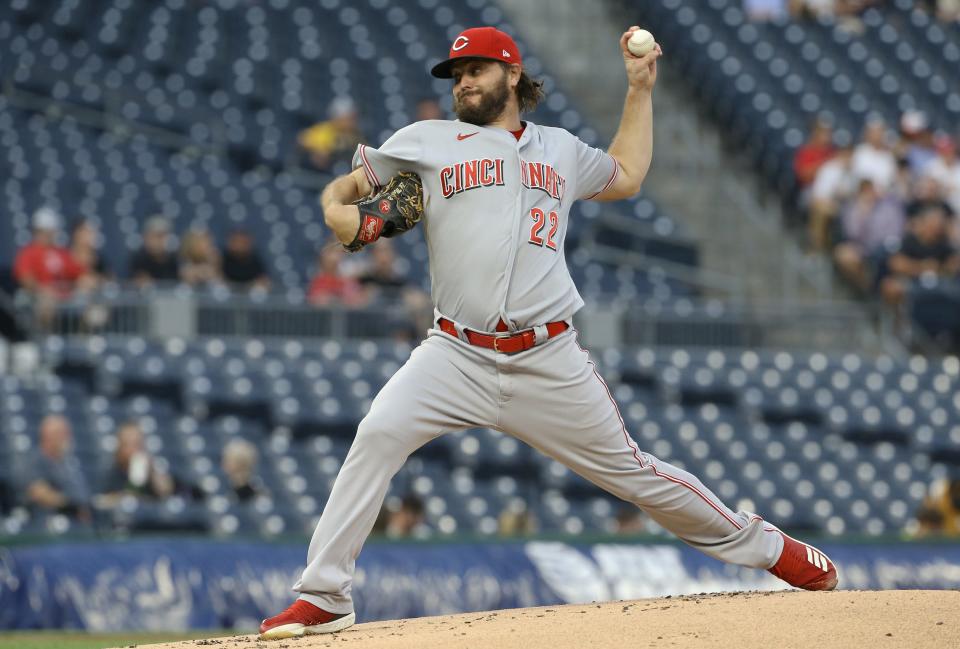Blackburn: Reds' decisions part of a disturbing trend in MLB

The offseason isn't even a month old and it has already been a long, depressing winter for Reds fans.
Just two months ago, the team was in the thick of the NL Wild Card race. It ended with a crash that would rival the worst days of Wall Street, but at least there was finally something to embrace.
This is a team that should be aiming to improve for another run in 2022. A few adjustments, particularly in the bullpen, and this would still be a team to take seriously next year. Somehow, for reasons we're only left to speculate, they've taken the polar opposite approach.
In the span of 10 days the team has traded its Gold Glove catcher in Tucker Barnhart, declined a team option on its most consistent starting pitcher in Wade Miley — who then went to the rival Cubs — and watched its best right-handed hitter opt out of his contract. That would be Nick Castellanos, the Silver Slugger Award winner in right field who was an MVP candidate for much of 2021.
Barnhart, with Tyler Stephenson primed to step into a major role, wasn't expected back at $7.5 million. Castellanos expectedly opted out to test the market with two years left on his deal; now the team has a chance to compete for his services. Waiving Miley, who struggled late in the year, was nothing more than a cost-cutting measure.

More are sure to come. There were multiple reports from the annual GM meetings last weekend that anyone making significant salary is up for trade. That covers a lot of bases, most notably top starters Luis Castillo and Sonny Gray.
If this were a movie, it would be Texas Chainsaw Massacre. If it were non-fiction, it would be a reality series straight from the home of Jeffery Dahmer. This is a straight-up chop job, and all fans can do is sit and watch the carnage unfold.
If you're a baseball fan, particularly one of a team like Reds, Indians or Pirates, chances are you've had enough of rebuilding, retooling or reallocating. It's all code for "we don't have to try to win, so we won't."
In the case of the Indians and Pirates, they've simply been cheap. Both ranked in the bottom five in league payroll in 2021. The Reds have just been wholly mismanaged, turning the money they spent into a half-hearted playoff run in 2021. Then they slammed their fingers while shutting their window of winning.
When Scott Boras, long-loathed MLB super agent, said at the GM meetings that the league has a flawed system that promotes tanking, he wasn't lying. He opined that the Braves won the World Series, defeating teams with higher payrolls in the process, because they were able to cherry-pick five castoffs — Adam Duvall, Eddie Rosario and Jorge Soler among them — from other teams dumping salary at the trade deadline.
Had those teams been serious about winning, in his mind, those players wouldn't have been available. The Reds, with a better record than Atlanta as late as Sept 1, elected to sit on their assets and make a run, as they should. Now they're one of those teams primed for the picking.
The problem, is it's guys like Boras who are partly to blame. Boras is the agent who has tailored so many deals that have forever changed the economic realities for teams that lack the revenue streams of the larger markets.
Granted, the Rays has found a model that has reaped consistent success, but they are the exception. For every Tampa, Cleveland and Oakland, who have effectively identified and developed home grown talent, and made subtle deals to fill their gaps, there is a Pittsburgh and Miami. Those teams are no closer to relevance than they were three years ago.

Your support helps keep the lights on at the Times Recorder. Stay connected with our daily stories, in-depth reporting and more by
clicking Subscribe
Subscribe
And then there are teams like the Dodgers, for example, who have combined their bottomless pockets with quality scouting and player development. That was a direct reflection of poaching Andrew Friedman, former Rays executive, who brought that influence with him to L.A.
Now here the Reds are, penny-pinching owner in tow, offering every Tom, Dick and Harry up for trade in the offseason. GM Nick Krall, official Guinea pig of Bob Castelleini, called it "aligning our payroll." Translation: It's not about winning, it's about our money.
As I have noted many times since this pandemic began, COVID-19 gave owners a built-in excuse to be cheap, because of the revenue claimed to be lost in 2020. Just how much remains a point of speculation, as those numbers are never made public.
Maybe the Reds are broke. If that's the case, then Castellini needs to sell it to someone who is not.
What we know is that baseball has a problem. It has always had a problem. The distance between the haves and have nots just keeps getting bigger.
And the nickel-rubbing Reds are quickly becoming a have not.
sblackbu@gannett.com
740-450-6723
Twitter: @SamBlackburnTR
This article originally appeared on Zanesville Times Recorder: Sam Blackburn: Reds' decisions part of a disturbing trend in MLB

